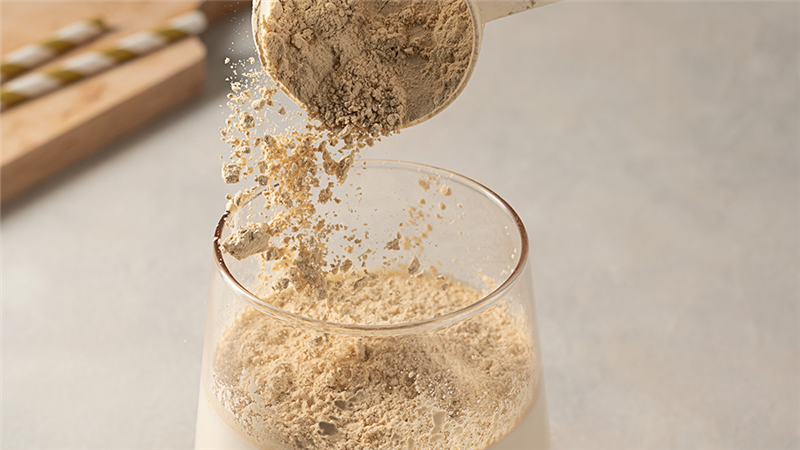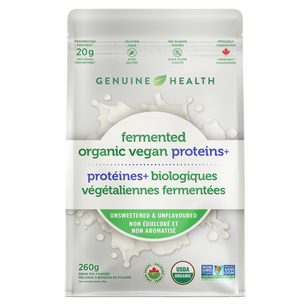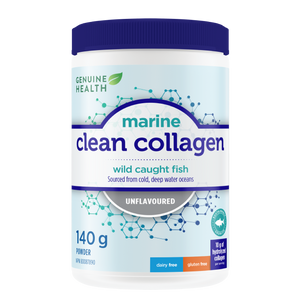The Ultimate Guide to Protein

If you want to look your best, feel your best and have the energy to do everything you love to do (and then some!) – protein is a key addition to your supplement regime.
Protein makes up a significant percentage of our body weight and is the second most abundant substance in our body (after water). It’s essential for the proper functioning of our entire body – so of course it makes sense to supplement.1
But, wait! It’s not as simple as going to the store and picking up just any protein. Protein supplements are not one-size-fits-all and different proteins have different effects in the body. When faced with a wall of protein products it can be a little tricky to make the right choice.
Not to fret – a little guidance can go a long way in determining the best protein for you.
Protein Basics: Amino Acids
Protein is all about amino acids. These are the building blocks of proteins that are obtained from our diet and generated in our own body2 – and they’re what make the difference when choosing a protein supplement.
In complete dietary protein sources, all “essential” amino acids are present in sufficient quantities.3 “Essential” means that we need to obtain them through diet because our body cannot produce them.3 A high-quality whey protein powder, or multi-sourced vegan protein supplement has higher levels of these essential amino acids – delivering complete proteins that nourish the body and support athletic performance and recovery.3
But what about collagen—is it a complete protein source? Collagen contains a different spectrum of amino acids than protein powders do and is lower in essential amino acids that we can’t make on our own—especially tryptophan—meaning that collagen is not a complete protein.4 However, collagen is higher in glycine, proline and hydroxyproline, amino acids required by the body to properly generate collagen, which provides strength and structure to our body.4
So, which protein is right for you?
As with any nutritional supplement, your choice of protein depends on what you’re looking to achieve. So, ask yourself:
Am I looking to maintain lean muscle?
Stick with a whey or multi-source vegan protein powder. Whey protein is a top choice for many because it’s quickly absorbed, rich in essential amino acids, and particularly high in leucine, which is crucial for muscle protein synthesis.5 However, for those who follow a plant-based diet, multi-source vegan protein blends can also provide a complete amino acid profile and support muscle building.5,6
How to buy:
- With whey proteins, look for a high-quality whey protein isolate that’s at least 90% protein. Also, make sure that your whey protein comes from milk and doesn’t contain a long list of additives. Genuine Health’s whey protein isolate+ is your purest option, made with clean and natural ingredients and an added digestive enzyme blend to support absorption.
- If you’re buying a vegan protein, look for a multi-source protein, as single-source vegan proteins don’t provide the optimal spectrum of amino acids (i.e. aren’t complete proteins).7 Vegan proteins are also notorious for being hard to digest, causing gas and bloating. Try fermented organic vegan proteins+, formulated for easy digestion and absorption. Each serving contains 20g of fermented plant protein, including all 9 essential amino acids making it a complete protein.
Am I looking to power my workouts, for better performance and recovery?
Stick with whey protein and consider supplementing with additional sports supplements like creatine. Whey protein has high levels of leucine, one of the “branched-chain” amino acids crucial for muscle building. Research shows that whey outperforms other proteins when it comes to muscle growth and preventing lean muscle loss, most likely due to its higher leucine content.8 For an added performance boost, you can complement whey protein with an additional sports supplement of your choice, like branched-chained amino acids, creatine, or electrolytes, to further support performance, muscle recovery, and hydration during intense workouts.9,10
How to buy:
- Once again, for whey proteins look for a high quality, pure whey isolates like Genuine Health’s whey protein isolate+.
- Creatine is a highly researched supplement that has been shown to support high-intensity performance and muscle recovery.10,11 Genuine Health’s fermented BCAA + creatine is a stacked formula like no other, combining powerful ingredients to drive you through every run, jump and lift. Formulated with 10g of fermented BCAAs, plus 5g of creatine and 5g of fermented glutamine. Power your anaerobic system and get the most out of your workouts while speeding up recovery and building lean muscle.
- Electrolytes can also be a great addition, to help maintain fluid balance and support hydration. enhanced electrolytes+ is specially formulated to help you replenish, recharge, and keep going - so you can push your limits and feel your best every step of the way!
-
Bonus: If you follow a plant-based diet, try fermented organic vegan proteins+ alongside fermented BCAA + creatine for the perfect vegan friendly performance boost!
Do I want to improve the hydration and look of my skin/ improve joint health/feel great overall?
Collagen is the most abundant protein in the body, playing a key role in skin elasticity, hydration, and joint function.12,13 As we age, collagen production naturally declines, leading to signs of skin aging and joint discomfort.12 Supplementing with collagen can help prevent this decline, and help support skin and joint integrity.12,13
How to buy:
- Look for a highly absorbable collagen supplement with around 5-15 grams of hydrolyzed collagen peptides per serving.14 Also make sure it’s made from sustainably sourced marine or bovine sources. clean collagen is available in both bovine and marine options, made with 10g of pure hydrolyzed collagen peptides for easy absorption. Both are also made with sustainable sources, whether from grass-fed, pasture-raised, antibiotic and hormone-free cattle OR wild caught fish, from deep cold oceans.
Do I want it all? The benefits of lean muscle support AND hydrated skin, reduced signs of aging, improved joint health and more?
Double up, with a high-quality protein AND a highly absorbable marine or bovine sourced collagen supplement. If you have adequate intake of essential amino acids in your diet and through other sources, adding a highly absorbable collagen like clean collagen can fortify the benefits of optimal protein intake and exercise!
So, don’t be overwhelmed when it comes to choosing the right protein powder. This simple guide will help you identify what you’re looking to gain from taking a protein supplement, so you can simply choose the protein(s) that are going to work for you!
Date modified: February 2025
References:
-
Heymsfield S, Bell JD, Heber D. Phenotyping, body composition, and precision nutrition. In: Heber D, Li Z, Ordovas J, eds. Precision Nutrition. Academic Press; 2024:143-152. doi:10.1016/B978-0-443-15315-0.00008-0
-
Lopez MJ, Mohiuddin SS. Biochemistry, essential amino acids. In: StatPearls. StatPearls Publishing; 2025. Accessed February 19, 2025. http://www.ncbi.nlm.nih.gov/books/NBK557845/
-
Hoffman JR, Falvo MJ. Protein – which is best? J Sports Sci Med. 2004;3(3):118-130. https://www.jssm.org/hf.php?id=jssm-03-118.xml#popup
-
Paul C, Leser S, Oesser S. Significant amounts of functional collagen peptides can be incorporated in the diet while maintaining indispensable amino acid balance. Nutrients. 2019;11(5):1079. doi:10.3390/nu11051079
-
Levers K, Vargo K. Building muscle mass: physiology, nutrition, and supplementation. In: Greenwood M, Cooke MB, Ziegenfuss T, Kalman DS, Antonio J, eds. Nutritional Supplements in Sports and Exercise. Springer International Publishing; 2015:123-157. doi:10.1007/978-3-319-18230-8_7
-
I VDH, Aj M, S W, et al. Plant protein blend ingestion stimulates postexercise myofibrillar protein synthesis rates equivalently to whey in resistance-trained adults. Med Sci Sports Exerc. 2024;56(8). doi:10.1249/MSS.0000000000003432
-
Deane CS, Bass JJ, Crossland H, Phillips BE, Atherton PJ. Animal, plant, collagen and blended dietary proteins: effects on musculoskeletal outcomes. Nutrients. 2020;12(9):2670. doi:10.3390/nu12092670
-
Tang JE, Moore DR, Kujbida GW, Tarnopolsky MA, Phillips SM. Ingestion of whey hydrolysate, casein, or soy protein isolate: effects on mixed muscle protein synthesis at rest and following resistance exercise in young men. J Appl Physiol. 2009;107(3):987-992. doi:10.1152/japplphysiol.00076.2009
-
Tambalis KD. The effect of electrolytes and energy drinks consumption on athletic performance – a narrative review. Eur J Fit Nutr Sport Med Stud. 2022;3(1). doi:10.46827/ejfnsm.v3i1.127
-
Kaufman MW, Roche M, Fredericson M. The impact of supplements on sports performance for the trained athlete: a critical analysis. Curr Sports Med Rep. 2022;21(7):232. doi:10.1249/JSR.0000000000000972
-
Jiaming Y, Rahimi MH. Creatine supplementation effect on recovery following exercise-induced muscle damage: A systematic review and meta-analysis of randomized controlled trials. J Food Biochem. 2021;45(10):e13916. doi:10.1111/jfbc.13916
-
Reilly DM, Lozano J. Skin collagen through the lifestages: importance for skin health and beauty. Plast Aesthetic Res. 2021;8(2). doi:10.20517/2347-9264.2020.153
-
Martínez-Puig D, Costa-Larrión E, Rubio-Rodríguez N, Gálvez-Martín P. Collagen supplementation for joint health: the link between composition and scientific knowledge. Nutrients. 2023;15(6):1332. doi:10.3390/nu15061332
-
Khatri M, Naughton RJ, Clifford T, Harper LD, Corr L. The effects of collagen peptide supplementation on body composition, collagen synthesis, and recovery from joint injury and exercise: a systematic review. Amino Acids. 2021;53(10):1493-1506. doi:10.1007/s00726-021-03072-x




















































